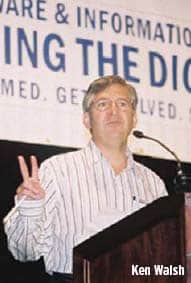UNITED STATES
Mandatory expensingusing flawed valuation modelswill lead to inaccurate and misleading information for investors. Ken Wasch, SIIA

The norwalk, Connecticut- based Financial Accounting Standards Board agreed unanimously at its meeting in March to add to its agenda the controversial issue of stockbased compensation. The move makes it more likely that US corporations will be forced to deduct billions of dollars in stock options from their earnings beginning in 2004.
The private-sector panel that sets accounting rules acted following scandals at Enron and other companies, whereby executives inflated earnings to boost the value of their stock options.
Technology companies that rely heavily on options to attract and motivate employees are upset, to say the least, with the FASBs decision. Mandatory expensing using the flawed valuation models available today will lead to inaccurate and misleading information for investors, says Ken Wasch, president of the Software & Information Industry Association.The plain fact is that employee stock option grants simply cannot be valued accurately, he says.
The London-based International Accounting Standards Board, which already has issued an exposure draft of rules that would treat options as a salary expense, says options-pricing models can be adapted to take into account market-based performance conditions.
According to FASB chairman Robert Herz,A move to require an expense treatment would be consistent with the FASBs commitment to work toward convergence between US and international accounting standards.
Herz says that, as part of its project, the panel will examine whether there are ways to improve the precision and consistency of measuring the cost of employee stock options.
Gordon Platt



